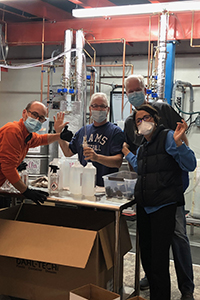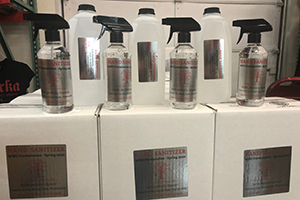BY KATHLEEN NELSON
April 20, 2020
Amid the shortages, suffering and uncertainty, the COVID-19 pandemic continues to provide opportunities to lift spirits in the face of adversity. Dr. William Schroer found his chance to contribute to the common good through his connection to a different kind of spirits: the distilled variety.

From left: Dr. Josh Glaser, Dr. Alan Schneider, Dr. William Schroer and Judy Lohrer, a nurse anesthetist, all on staff at SSM Health DePaul Center, work the bottling and boxing line at St. Louis Distillery. The distillery, co-owned by Schroer, retooled to produce hand sanitizer for nursing homes, first responders and other essential businesses facing shortages in early April.
Working at his boutique vodka distillery and enlisting his colleagues at SSM Health DePaul Hospital in St. Louis, Schroer and his team produced hand sanitizer for senior living centers and first responders facing a shortage.
An orthopedic surgeon by vocation, Schroer found himself with limited work after the spread of COVID-19 forced hospitals in mid-March to postpone elective surgeries. A co-owner of St. Louis Distillery, his avocation was shuttered by a stay-at-home order that put tours and tastings on hiatus.
"A huge segment of our health care community is overburdened and stressed while doing heroic work," Schroer said. "But there were times when I felt pretty useless."
Forces combined, though, for Schroer to make a valuable contribution in the fight against the transmission of the respiratory virus. In mid-March, the Alcohol and Tobacco Trade and Tax Bureau announced an exemption for distilled spirits permit holders, such as St. Louis Distillery, from the requirement to obtain additional permits or bonds to manufacture hand sanitizer. Schroer first reached out to DePaul and was assured that it had an adequate supply. A friend in the long-term care industry told him that shortages of hand sanitizer loomed at some nursing homes in Missouri and Arkansas.
"We then talked to first responders in St. Charles county, as well as fire districts in St. Charles and St. Louis counties," he said. "There seemed to be a need. So that's when we decided, 'Let's do this.'"

Dr. William Schroer and his co-owners of St. Louis Distillery spent two weeks retooling the distillery and sourcing the ingredients and products to make hand sanitizer. Working with colleagues from SSM DePaul Health Center in St. Louis, they bottled the product in 16-ounce spray containers and half-gallon jugs, which are used to refill the sprayers.
Vodka is just 40% alcohol — below the 65% standard set by World Health Organization for hand sanitizer — so Schroer started from scratch. He spent two weeks sourcing the ethanol, glycerin and hydrogen peroxide needed for WHO's formulation. Spray-top bottles proved hard to find. He placed several orders, only to learn days later that the vendor had oversold. Schroer eventually found a vendor with 1,500 16-ounce spray-top bottles and bought him out, then he ordered half-gallon jugs as containers for refills.
At the same time, distillery co-owner Steve Herberholt, an engineer by trade, devised a filtration system that would prevent the gooey glycerin from building up and damaging the distillery's barrels, where the ingredients were mixed, as well as the pumping system and bottle works.
"He MacGyvered the heck out of it," Schroer said.
By the first weekend of April, Schroer had assembled a team of coworkers from DePaul to bottle and box the product. His group included Dr. Josh Glaser, a general surgeon; Dr. Alan Schneider, an anesthesiologist; Judy Lohrer, a nurse anesthetist, and Paul Diesfeld, a physician assistant.
"It sounded like it would be a fun way to help people in need of a necessary product," said Glaser, one of three team members who filled bottles while others boxed the finished product. Though several other colleagues volunteered, Schroer limited the size of the group "to respect social distancing." After running a successful test of 50 bottles the first night, Schroer said, "We went crazy and made about 500 over Saturday and Sunday."
During the limited run, the distillery's third partner, Greg Deters, took the boxes home and applied labels to the bottles — again to adhere to social distancing recommendations. He returned the labelled product to the distillery, where it was distributed to first responders, nursing facilities and other essential businesses for a nominal fee.
Glaser saw the impact of what he called "a really fun weekend" when the owner of a nursing home arrived at the distillery to pick up his order. "He was so grateful because it's so hard to find," Glaser said of the hand sanitizer. "It was powerful and humbling to hear his gratitude, and I was thankful to be a part of it."
The rumor of a new source for hand sanitizer spread quickly and Schroer and his partners were besieged with requests for product. Deters is a native of Quincy, Ill., about 120 miles north of St. Louis. When his friends back home reached out, he shared 30 cases with senior living centers and the local police department.
But even a distillery's access to ethanol is limited. Schroer said he had enough to produce about 800 gallons and could source ethanol for 200 more. Though he received a request from a private citizen for 300,000 bottles, "we're trying to stick with first responders and nursing facilities. We're helping to fill a need, not turn this into a business venture. Besides, my wife says I'm working harder now than when I'm in surgery full time."
Though emphasizing that the temporary venture was light-hearted and rewarding, Glaser was quick to praise its altruistic motivation and professional execution: "Bill and his co-owners are the heroes here. They paid for this out of their own pocket, figured out how to do it quickly and filled a need that people really appreciate."